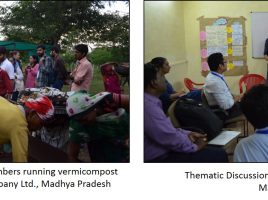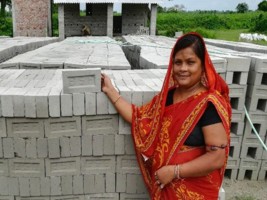Green and Inclusive Future – A New World is Possible
The future is green and it is inclusive or there is no future. As we turn the decade and the new year, the one lingering image of the past year is of the FUTURE – our youth demanding that governments and national leaders that hold power and money either change paths or move off the path.
In our universities, our market places, our homes and institutions, young people are not only raising the demands for their right to a sustainable future; they are also showing by example what can be done. Co-working and living, sharing economies, green construction systems, new energy start-ups, bike sharing apps, waste to wealth interventions, water saving systems, organic foods and eco-tourism, the list goes on and on. Young people are demonstrating what is possible.
A new economy is possible, a new global village is possible. And as nationalist fires rage in country after country straining at the ties of the present global village that was brought into being by trade and economic co-operation, a new globalisation is emerging. The crisis of climate change and over consumption of natural resources has catalysed a global movement for change. This is largely a citizen’s movement, itself a coalition of many different movements, is pushing a transition to a greener, more inclusive future for each one and all. Interestingly, such a future recognises the need for local action in local economies as a fundamental condition for sustainability.
The Future is therefore not just green and inclusive, it is decentralised. A global economy composed of a multitude of local economies, each one green and inclusive. What will be the ties that will bring these many decentralised interventions together at a global level?
- Knowledge and skills fuelled by IOT and AI. Open source knowledge sharing made possible by new technology platforms will bring communities across the globe together.
- Self-limiting conscious consumption supported by shifts in social behaviours that reward accumulation of experience rather than of capital assets and that prioritizes service over ownership.
- Camaraderie built on an understanding of Ubuntu that we are all in this together. Inequity is dangerous for long term prosperity, even though it may provide short term gains to a few.
Today, science informs us why it is necessary, evidence shows us how it is possible and wisdom tells us that this is the only way. With the head and the hands and the heart aligned, all we need is the voice that advocates for a green and inclusive future for all.
The Green Economy Coalition (GEC) is the world’s largest civil society alliance. Its members, in their own geographies, are developing and demonstrating technical, social and market solutions that bring communities and small entrepreneurs to the fore and that are by design low-carbon and resource efficient. The GEC is tracking this transition at local, national and global levels, advocating for shifts in global and national economic policies to enable this local green and inclusive economy agenda to take its rightful place and stake its claim in the new global order.
Zeenat Niazi
zniazi@devalt.org
The views expressed in the article are those of the author’s and not necessarily those of Development Alternatives.
This blog first appeared as an editorial in Development Alternatives Newsletter January, 2020
https://www.devalt.org/newsletter/jan20/Edit.htm






Leave a Reply